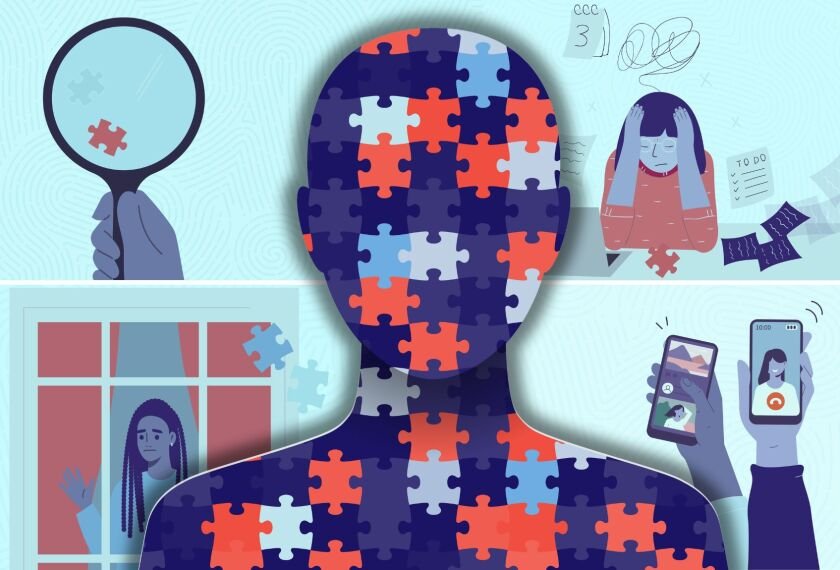Navigating Mental Health Crisis Situations for Yourself and Loved Ones
Experiencing a mental health crisis can feel overwhelming, but it's important to remember that you're not alone. Whether you're experiencing a personal crisis, supporting someone in distress, or concerned about your child's well-being, there are resources and strategies available to provide support and guidance.
As a Therapy Group in Santa Barbara, we offer both in-person and telehealth counseling, often supporting individuals and families navigating crisis situations across Santa Barbara, Goleta, Montecito, and Carpinteria. This psychoeducational guide will provide practical advice on how to recognize the warning signs of a mental health crisis and how to access professional mental health support — whether locally or through California telehealth services.
Recognize the Signs of a Crisis
The reasons for a mental health crisis —just like your mental health— are unique to you. What a crisis is for one person might not be for another. Some warning signs in adults include:
Suicidal thoughts or making plans
Self-harming or self-medicating
Inability to perform daily tasks, bathing, dressing, etc.
Paranoia
Increased agitation, risk-taking/out-of-control behavior
Psychosis such as hallucinations or delusions
Isolation or withdraw from work, school, family, and friends
Recognizing the signs can look different for adults and youth. For children it may look like:
Having either extreme energy or no energy
Feeling confused with irrational thoughts
Gaining or losing weight quickly
Having rapid mood swings
Isolating from friends and family, not coming out of their room
Sleeping all the time or not being able to sleep
According to the American Psychological Association (APA), the most common sign of crisis is “a clear and abrupt change in behavior.”
What to Do in a Mental Health Crisis
First, assess the immediacy of the situation to help determine where to start:
Is the person in danger of hurting himself/herself, others, or property?
Do you have time to start with a phone call for guidance from a mental health professional?
Do you need emergency assistance?
Then, respond.
If the situation is life-threatening, call 911 and ask for immediate help.
If you don’t think there is immediate danger, call your county mental health crisis unit or take the person to the nearest hospital emergency room.
Check out this article for national hotlines to contact for support.
Santa Barbara County Mobile Crisis Resources
All Ages Crisis Line: ACCESS Line 888-868-1649
24/7 available for questions, crisis needs, linkage to alcohol, drug or mental health services
SAFTY Crisis Line (for youth under 20): SAFTY Crisis Line 1-888-334-2777
Crisis Text Hotline: Text HOME to 741741
TCRC Crisis Response Services: (800) 953-9593 (Existing Tri-Counties Clients)
Domestic Violence Hotlines:
Santa Barbara (805) 964-5245
Santa Ynez (805) 686-4390
Lompoc (805) 736-0965
Santa Maria (805) 925-2160
Santa Barbara County Crisis Walk In Services:
South County:
Cottage Hospital Emergency Room- Psychiatric Services: West Junipero St. and Castillo St. Santa Barbara, CA 93105, 805-569-7210
SB County Behavioral Wellness Crisis Services: 315 Calle Del Remedio Suite B Santa Barbara, CA 93110, 805-884-6850
North County:
Lompoc - Adult Mental Health Services: 117 North B Street, Lompoc, CA 93436, 805-737-6690
Lompoc Valley Medical Center: 1515 E Ocean Ave, Lompoc, CA 93436 (24 hour ER), 805-737-3300
Santa Maria- North County Crisis Services, 212 West Carmen Lane Santa Maria, CA 93458, 805-739-8700
Marian Regional Medical Center, 1400 E Church St, Santa Maria, CA 93454 (24 hour ER), 805-739-3000
How to Help Someone in a Mental Health Crisis:
Begin by assessing whether they pose a risk to themselves or others. This can help you decide what resource to reach out to. As NAMI states, the primary objective in a crisis is to de-escalate the situation. Below are a few different techniques to try:
Maintain Composure: Speaking calmly and refraining from raising your voice can prevent escalating panic. Try to refrain from engaging in arguments or overacting. NAMI suggests moving at a slow pace to help slow down the person in crisis.
Listen Attentively: Active listening can aid in figuring out what they need and understand their current symptoms.
Inquire About Assistance: Demonstrating support and empathy can reassure them of your presence, particularly if you're not physically present. Explore ways to assist them, but recognize they might not be capable of articulating their needs clearly, so offering specific suggestions is helpful. For example you could ask, "Do you need me to call someone for you?" or "Do you need a ride to the hospital?"
Present Alternatives: You may feel like you want to take control of the situation, however that can make some people feel overwhelmed. Instead, present them with choices and be patient.
Respect their Space: Avoid making them feel trapped or confined. Refrain from physical contact unless they give you permission.
Source: Psych Central
Reaching out for help is a sign of strength. Whether you're seeking support for yourself or someone else in a crisis, numerous resources are available. It's essential to break the stigma surrounding mental health, fostering a community of understanding, empathy, and encouragement. Together, we can support each other through the challenges of mental health crises.
If you or someone you love is experiencing a mental health crisis in Santa Barbara, Goleta, Montecito, or Carpinteria, you don’t have to navigate it alone. Working with a Santa Barbara Therapist or accessing Santa Barbara Therapy, Goleta Therapy, Montecito Therapy, or Carpinteria Therapy services can help you feel supported during difficult times.
Additionally, telehealth counseling and California telehealth services are widely available, offering virtual therapy options for those in remote areas or preferring online care. Many providers also offer Los Angeles virtual therapist services for individuals outside of the Santa Barbara area.


